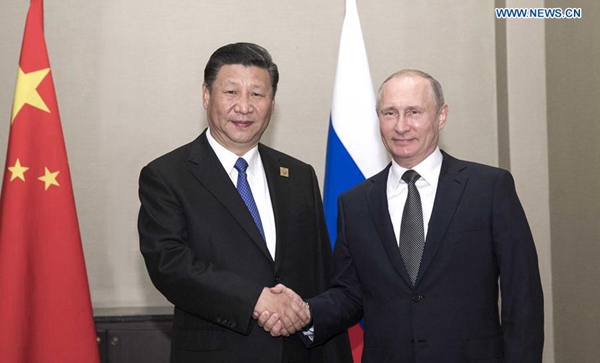The growing China-Russia strategic partnership
- By Sabena Siddiqui
 0 Comment(s)
0 Comment(s) Print
Print E-mail China.org.cn, July 27, 2017
E-mail China.org.cn, July 27, 2017
|
|
|
Chinese President Xi Jinping (L) meets with Russian President Vladimir Putin in Astana, Kazakhstan, June 8, 2017. [Xinhua] |
Symbolizing the growing China-Russia strategic alliance, joint military exercises are being held in the Baltic Sea with China’s most advanced guided missile destroyers participating along with a Russian flotilla.
Making a bold statement, the week-long Joint Sea 2017 exercise integrates naval combat tactical developments, co-ordination capabilities, air defense, anti-piracy and emergency rescue operations for the first time.
Starting with simulated drills, two tactical mixed assault groups were deployed by a joint control center constituting of commanders from both countries so that the air and sea forces involved would be under unified guidance.
Wang Xiaoyong, deputy captain of a Chinese destroyer detachment, explained: "The simulation exercise was conducted for two purposes, namely, assisting commanders at all levels to become more familiar with drill objectives and procedures, as well as enhancing coordination and tacit understanding between naval commanders of the two countries.”
Stable Russia-China relations provide much-needed balance on current unpredictable global stage.
Facing political challenges of mutual concern, Russian President Vladimir Putin and Chinese President Xi Jinping have met at least 20 times in the last four years and worked to ensure win-win co-operation and common development. Just before their recent meeting in Moscow, Putin described it as “the year’s major event in bilateral relations.”
During his state visit, President Xi observed that China-Russia relations were at their “best in history” and stressed that both countries have a great potential to be unlocked in economic and trade cooperation.
Speaking to the Russian media, the President noted that border issues left over by history had been completely resolved so that the 4,300-km common border formed a bond of friendship between two peoples. He further stated that the two nations were each other’s most trustworthy strategic partners having built high-level mutual trust.
Steadily growing in terms of potential and magnitude, the China-Russia strategic partnership is solidly based on common interests in terms of national security, territorial integrity and sovereignty.
Playing a major role at various international forums, such as the Shanghai Cooperation Organization (SCO), Belt and Road Initiative and BRICS, both countries are moving ahead decisively. At the Moscow meeting, the two sides also decided to link the BRI with Russia’s Eurasian Economic Union (EAEU). Most notably, the Chinese and Russian foreign ministries issued a joint statement regarding North Korea’s missile test on July 3.
Commencing just as the U.S. and its allies were winding up a massive exercise named Saber Guardian, focused on countering “Russian aggression,” these Joint Sea 2017 exercises are also a “show of strength.”
Providing details, Beijing naval expert Li Jie said: "By sending its most advanced guided-missile destroyers, China is expressing its sincerity to Russia and also sends a strong signal to other countries who plan to provoke us.”
Discussing the larger picture, political analyst Chris Bambery believes the Russian-Chinese alliance has the potential to offset America militarily. Amid a current global scenario replete with unpredictable power politics, both nations represent stability and unlimited scope for dialogue.
In one significant move, last year, they announced their mutual oil trading activities would be conducted in their own national currencies; this works out well as China is the world’s largest oil importer while Russia is the largest fuel exporter with oil and gas making up more than half of its total exports and providing one-third of government revenues.
Constricted by various sanctions, Russia is increasingly reliant on the yuan as an international trade settlement currency, and, in the past year, cross-border transactions saw 27.7 percent year-on-year growth to 30.46 billion yuan.
Not only that, the Industrial and Commercial Bank of China has begun operating as a yuan-clearing bank in Moscow. During President Xi’s visit to Moscow, multiple deals collectively worth over US$10 billion were finalized in various fields between the two nations.
Evaluating current Russia-China synergy, Sergei Ordzhonikidze, chairman of the Russian Public Council for International Cooperation and Public Diplomacy under the Public Chamber of Russia, has said: “Russia and China now have this understanding. Russia and China also have a clear understanding of how they can help each other.
“In UN Security Council voting, China and Russia often vote together and use a veto together on most serious and major issues. In regard to the Syrian crisis, Iraq and the demilitarization of the Korean Peninsula, Russia and China share similar positions. I do not see areas of potential friction in the interstate relations.”
Sabena Siddiqui (Twitter: @sabena_siddiqi) is a foreign affairs journalist and lawyer based in Pakistan.
Opinion articles reflect the views of their authors, not necessarily those of China.org.cn.







Go to Forum >>0 Comment(s)